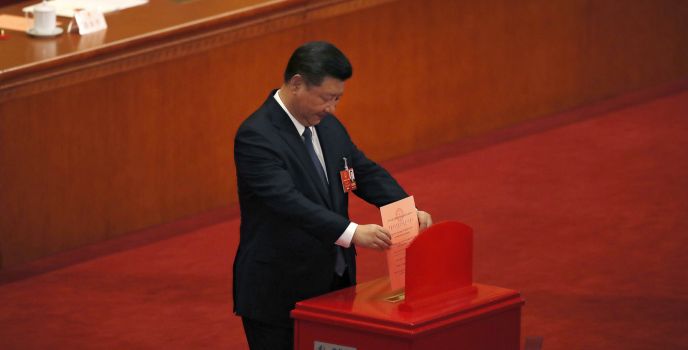Since the 1980s, and even more so under the leadership of Xi Jinping, Beijing’s global governance discourse has consistently portrayed China as a democratic-state. To external observers, this notion often appears as a contradiction; a concept which is at odds with the country’s political reality. Yet, within the country, the Party-State has rigorously presented itself as a system embodying the democratic values of rule of law and elections, a portrayal carefully constructed by its leaders and amplified through its state-controlled media. In practice, however, Chinese-style democracy functions in a manner fundamentally different from liberal democracies and is largely overshadowed by the pervasive and overarching presence of the Party.
"By shifting the evaluative criteria of democracy from electoral competition to governance outcomes, the CPC effectively seeks to challenge the normative primacy of liberal democratic systems."
In 2024, as millions of voters in the United States and India headed to elect their leaders, a different kind of election narrative was unfolding in China. In Chinese media and academic discourse, these elections were analyzed not as exercises of democratic celebration but were instead projected as a reflection of widespread division and inefficiency. For instance, an editorial in a leading state-run media outlet described the U.S. election as a ‘chaotic spectacle’, while India's electoral process was framed as a logistical marvel overshadowed by systemic inequalities. These projections were not limited to the elections of 2024 alone. For over a decade, Chinese discourse on democracy has sought to delegitimize the western-liberal concept of democracy while simultaneously seeking greater legitimacy for a uniquely Chinese style of governance.
This report, in light of the Party’s dual-projection on democracy, both internally and externally, seeks to examine the diverse yet interconnected dynamics through two lenses. First, it traces the evolution of the Party’s domestic democracy narrative, examining how successive leaders from Mao Zedong to Xi Jinping have adapted and redefined the concept to align with their governance priorities and to respond to socio-political changes within Chinese society and the Party itself. This section also explores internal debates that produced varied interpretations of the concept, as well as the mechanisms of local elections, consultations, and other practices that the Party presents as hallmarks of its ‘democratic model’. Second, the report investigates the CPC’s framing of foreign elections through two case studies—the 2024 elections in India and the United States—to analyze how these events are interpreted and strategically embedded within the Party’s broader political discourse.
Some Key Takeaways:
- The Party’s vision of ‘Democracy with Chinese Characteristics’ has been intricately tied to the socio-economic realities of governing a vast and diverse population. It has served as both a response to the needs of China’s unique political situation and a mechanism to maintain centralized control, irrespective of the leader that has claimed power.
- By shifting emphasis from procedural safeguards to governance outcomes, and from institutional checks to performance-based validation, the CPC has aimed to construct a system of governance where the ends justify the means, so long as the ends align with Party-defined national objectives.
- Through a systematic articulation of the dysfunctions, polarization, and instability associated with liberal electoral politics, the CPC’s machinery sought to advance a counter-claim: that the Party-State model offers a more coherent, efficient and socially stable form of governance.
- In regions where democratic institutions have struggled to deliver tangible outcomes, and where governance is judged by development rather than multiparty competition, the Chinese model is increasingly appearing attractive.
- Based on an assesment of Party rehtoric, the 2024 elections in the United States and India, provided the CPC with the strategic opportunity to advance its political narrative on the global stage. In both cases, Chinese media and academic commentaries focused less on the results and more on what the process in its interpretation revealed; political gridlock in Washington, identity-driven fragmentation in New Delhi, and most of all, the seeming inability of multiparty systems to deliver coherent and meaningful governance.
- For democratic states, the growing sophistication of China’s narrative strategy presents a pressing challenge, one that cannot be met solely with policy but must also be addressed at the level of political storytelling and counter narratives.
China's domestic and external narrative projections can be categorized as part of a larger Global Narrative Project, which in many ways informs us of a Party that is engaged in a complex balancing act; asserting the superiority of its system while critiquing others to consolidate its standing at home and abroad. By exploring the unique dual projections, the report seeks to uncover not just what the CPC says about democracy, but why it matters, and what it tells us about the future of the broader contest for political ideas in the 21st century.
To read the full report, click here.



Author
Ratish Mehta
Ratish Mehta is a Senior Research Associate at ORCA. He is the co-editor of the Special Issue on India’s Soft Power Diplomacy in South Asia and serves as the co-lead for the project ‘The Episodes of India-China Exchanges: Modern Bridges and Resonant Connections’, which is rooted in the desire to enhance public consciousness of cross-cultural contributions of both societies. Ratish’s area of interest includes understanding the value of Narratives, Rhetoric and Ideology in State and Non-State interactions, deconstructing political narratives in Global Affairs as well as focusing on India’s Foreign Policy interests in the Global South and South Asia. He was previously associated with The Pranab Mukherjee Foundation and has worked on projects such as Indo-Sino relations, History of the Constituent Assembly of India and the Evolution of its Democratic Institutions. He is also the co-convenor of ORCA's Global Conference on New Sinology (GCNS), which is India's premier dialogue driven China conference. He is an alumnus of Ambedkar University, Delhi.
Download PDF